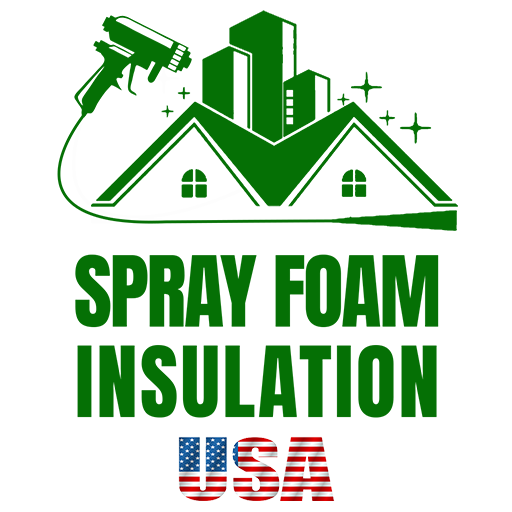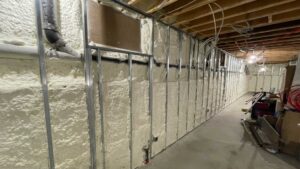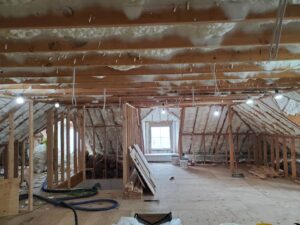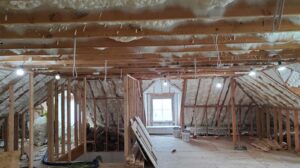Closed Cell Spray Foam Insulation: Quick Guide
- High R-Value: Offers superior insulation per inch compared to other types.
- Moisture Barrier: Practically waterproof, preventing mold and water damage.
- Air Seal: Minimizes air leaks, enhancing energy efficiency.
- Improves Structural Strength: Adds to the rigidity and longevity of the structure.
- Eco-Friendly Choice: Low Global Warming Potential (GWP) options available.
Energy efficiency, air quality, and comfortable living spaces have become top priorities for homeowners and business owners in NY and NJ. If you’re exploring insulation solutions that tick these boxes, closed cell spray foam insulation emerges as a compelling option. Its high R-value indicates excellent insulation capabilities, tapping into savings on energy bills from day one. Additionally, its moisture and air-seal properties combat mold while ensuring your indoor environment remains cozy and draft-free. What’s more, for those concerned with sustainability, recent advancements mean eco-friendlier formulations are now within reach.
Closed cell foam is not just about keeping the cold or heat at bay; it’s also about fortifying your property. This insulation type enhances structural integrity, making it a wise investment for the long term. Whether retrofitting an old building or insulating a new one, closed cell spray foam adapts to your needs, delivering a high-performance shield against the elements and noise, ensuring peace and comfort.
This introduction aims to shed light on the pivotal role closed cell spray foam can play in achieving a well-insulated, energy-efficient, and healthy living space or workspace.

Understanding Closed Cell Spray Foam Insulation
When we talk about making our homes or workplaces more energy-efficient and comfortable, closed cell spray foam insulation stands out as a superhero. Let’s dive into why it’s so effective, focusing on its R-value, vapor barrier capabilities, air seal properties, and structural integrity.
R-value: The Measure of Resistance
The R-value is a way to measure how well insulation can resist heat flow. The higher the R-value, the better the material is at insulating. Closed cell spray foam insulation has an impressive R-value of about 6 to 7 per inch. This means it’s incredibly good at keeping heat in during winter and out during summer, making your space more comfortable and reducing energy bills.
Vapor Barrier: Keeping Moisture at Bay
One of the unique advantages of closed cell spray foam is its ability to act as a vapor barrier. This means it can prevent moisture from passing through walls, ceilings, and floors. Moisture in insulation can lead to mold, mildew, and even structural damage over time. By blocking moisture, closed cell spray foam helps protect the integrity of your building and the health of its occupants.
Air Seal: The Invisible Shield
Air leakage is a major culprit in energy loss. Closed cell spray foam creates a continuous air barrier, filling gaps and cracks where air might enter or escape. This air seal means your heating and cooling systems don’t have to work as hard, saving energy and money. It’s like wrapping your building in an invisible shield that keeps conditioned air in and unconditioned air out.
Structural Integrity: Adding Strength
Unlike other forms of insulation, closed cell spray foam adds structural integrity to the walls and roofs where it’s applied. Its dense nature can help buildings withstand external pressures, like strong winds or heavy snow. This added strength is a bonus on top of the insulation’s thermal performance.
In summary, closed cell spray foam insulation is a powerful tool for enhancing the energy efficiency, durability, and comfort of a building. Its high R-value, moisture-blocking capabilities, air-sealing properties, and ability to add structural strength make it an excellent choice for a wide range of applications.
As we move into the next section on the Applications of Closed Cell Spray Foam Insulation, we’ll explore how these properties make it suitable for everything from residential homes to commercial spaces, attics, crawl spaces, and retrofitting projects. Stay tuned to learn how to leverage the full potential of this innovative insulation material in your next project.
Applications of Closed Cell Spray Foam Insulation
Closed cell spray foam insulation is a superhero in insulation. Its unique properties make it a go-to choice for a variety of applications. Let’s dive into where and how it’s used.
Residential
In homes, closed cell spray foam insulation is a game-changer. It’s perfect for sealing off drafts and leaks in walls, roofs, and floors. Whether you’re building a new house or upgrading an old one, this insulation fits right in. It makes your home cozy in winter and cool in summer, saving you money on energy bills.
Commercial
Businesses love closed cell spray foam insulation too. It’s used in offices, warehouses, and retail spaces to keep energy costs down. Plus, it helps create a comfortable environment for employees and customers. In buildings where temperature and moisture control are critical, like in food storage facilities, this insulation is a must-have.
Attics
Attics are often the main culprits in heat loss. Closed cell spray foam insulation applied in attics forms a tight barrier that heat can’t sneak through. It also prevents moisture buildup, which is essential in keeping the structure of your home safe and sound.
Crawl Spaces
Crawl spaces might be out of sight, but they shouldn’t be out of mind. Insulating them with closed cell spray foam keeps moisture out and warmth in. This not only protects your home’s foundation but also wards off mold and pests.
Retrofitting
Upgrading insulation can seem daunting, especially in older buildings. But with closed cell spray foam, retrofitting becomes a breeze. It can be applied to the interior of walls or under roofs without tearing everything apart. This makes it an ideal solution for improving energy efficiency and comfort with minimal disruption.
In conclusion, closed cell spray foam insulation is versatile, effective, and transformative. Whether you’re insulating a cozy bungalow, a bustling commercial space, or anything in between, it offers unmatched benefits. Ready to take the next step? Let’s move on to the Advantages of Closed Cell Spray Foam Insulation and discover how it can make your space more energy-efficient, comfortable, and durable.
Advantages of Closed Cell Spray Foam Insulation
Closed cell spray foam insulation is like a superhero for your home or business. It tackles some of the biggest challenges in keeping spaces comfortable, efficient, and protected from the elements. Let’s break down its superpowers: Energy Efficiency, Moisture Barrier, Longevity, and High R-value.
Energy Efficiency
Imagine wrapping your building in a thermal blanket that keeps the warm air in during winter and out during summer. That’s exactly what closed cell spray foam insulation does. Its superior air-sealing properties mean that heating and cooling systems don’t have to work as hard, which can lead to significant savings on energy bills. In fact, buildings treated with this insulation often see a dramatic decrease in energy costs.
Moisture Barrier
Water and moisture are enemies of any structure, leading to problems like mold and rot. Closed cell spray foam insulation acts like an invisible shield, repelling water and not absorbing moisture. This means a drier, healthier environment for everyone inside. It’s especially beneficial in areas prone to flooding or with high humidity.
Longevity (80-100 years)
Investing in insulation should be a once-in-a-lifetime event. With closed cell spray foam insulation, it practically is. This durable material can last between 80 to 100 years, thanks to its stable chemical properties that don’t degrade over time. This long lifespan makes it an excellent investment, providing peace of mind and saving the hassle and cost of replacement.
High R-value
The R-value measures how well insulation can resist heat flow. The higher the R-value, the better the insulation. Closed cell spray foam insulation boasts one of the highest R-values per inch of any insulation material available, ranging from R-6 to R-7 per inch. This means it provides outstanding thermal insulation, even with relatively thin layers, making it ideal for spaces where thickness is a concern.
By choosing closed cell spray foam insulation, you’re not just insulating your space; you’re upgrading it. You’re making it more energy-efficient, protecting it against moisture, ensuring it lasts for decades, and maximizing its thermal resistance. It’s a powerful way to enhance comfort and efficiency in any building.
Now that we’ve seen the incredible advantages of closed cell spray foam insulation, let’s address some Common Concerns and Solutions to ensure you feel confident in choosing the best insulation for your project.
Common Concerns and Solutions
When considering closed cell spray foam insulation, you might have a few questions or concerns. Let’s dive into some of the most common ones and find the solutions.
Thermal Bridging
Concern: Thermal bridging happens when heat passes through the more conductive materials in a building, like wood or steel studs, bypassing the insulation.
Solution: Closed cell spray foam insulation can be applied directly to the underside of the roof and on the sides of the studs, effectively covering these thermal bridges. This creates a continuous insulation layer that minimizes heat loss.
Cost-effectiveness
Concern: The initial cost of installing closed cell spray foam insulation can be higher than other types of insulation.
Solution: While the upfront cost is higher, the savings on energy bills can be significant. Closed cell spray foam insulation provides an air and vapor barrier, which can reduce the building’s heating and cooling costs. Over time, these savings can outweigh the initial investment.
Environmental Impact
Concern: Some people worry about the environmental impact of the chemicals used in closed cell spray foam insulation.
Solution: Many manufacturers now use eco-friendly blowing agents that have a lower global warming potential. Additionally, the longevity and energy efficiency of closed cell spray foam contribute to its overall sustainability. By reducing energy consumption, it helps lower the carbon footprint of buildings.
Application Precision
Concern: The effectiveness of closed cell spray foam insulation depends on precise application.
Solution: Hiring experienced and certified professionals ensures the foam is applied correctly. Proper installation not only guarantees the insulation’s performance but also its durability. Look for contractors who specialize in spray foam insulation and have a proven track record.
By addressing these common concerns, you can feel more confident in choosing closed cell spray foam insulation for your project. Its ability to provide a high R-value, act as a moisture barrier, and contribute to the structural integrity of a building makes it an excellent choice for a wide range of applications. With the right approach, the benefits of closed cell spray foam insulation can far outweigh any initial concerns.
Frequently Asked Questions about Closed Cell Spray Foam Insulation
When considering any home improvement or construction project, it’s natural to have questions. Closed cell spray foam insulation is no exception. Let’s dive into some of the most common queries we receive.
What are the downsides of closed cell spray foam?
Cost: One of the first things you might notice is that closed cell spray foam insulation often comes with a higher upfront cost compared to traditional insulation materials like fiberglass or cellulose. However, the energy savings over time can offset this initial investment.
Installation Precision: Closed cell spray foam needs to be applied carefully and precisely by professionals. If not done correctly, it can lead to gaps or over-thickness, which can affect its performance.
Ventilation: Because this insulation is so effective at creating an air seal, proper ventilation becomes crucial to prevent indoor air quality issues. It’s important to pair it with a good ventilation system.
How long does closed cell spray foam last?
Closed cell spray foam insulation is known for its longevity. When properly installed, it can last the lifetime of your home, often 80 to 100 years. Its durability is one of its major advantages, making it a once-in-a-lifetime investment for most homeowners. This long lifespan not only provides continuous energy savings but also adds to the overall value of your property.
Is closed cell spray foam the best insulation for my project?
The answer depends on several factors:
-
Climate: In areas with extreme temperatures or high humidity, closed cell spray foam’s moisture barrier and high R-value can offer superior comfort and protection against the elements.
-
Space: If you’re insulating areas prone to moisture, like basements or crawl spaces, or if you need to add structural strength, closed cell spray foam is a great choice.
-
Budget: While more expensive upfront, the long-term energy savings and durability might make it the most cost-effective option for your project.
-
Environmental Considerations: If reducing your carbon footprint is a priority, closed cell spray foam’s ability to improve energy efficiency can significantly lower a home’s carbon emissions over time.
In conclusion, closed cell spray foam insulation can be an excellent investment for many projects, offering unparalleled energy efficiency, moisture protection, and longevity. However, it’s important to consider the specific needs of your project and consult with a professional to ensure it’s the right choice for you. Remember that the right insulation can make a significant difference in your home’s comfort and energy consumption.
Conclusion
In wrapping up our exploration of closed cell spray foam insulation, it’s clear that this material stands at the forefront of sustainable, efficient, and comfortable home and building insulation solutions. At Spray Foam Insulation USA, we’ve dedicated ourselves to providing you with insulation options that don’t just meet the standard but set new benchmarks for quality and performance.
Sustainable Insulation: Our commitment to sustainability is reflected in every canister of closed cell spray foam insulation we provide. By choosing this insulation for your project, you’re not just optimizing your energy use; you’re also making a choice that supports a healthier planet. Closed cell spray foam insulation contributes to a significant reduction in carbon footprint, thanks to its superior thermal efficiency and long lifespan of 80 to 100 years.
Maximum Comfort and Efficiency: There’s nothing quite like the peace of mind that comes from knowing your space is insulated with one of the most advanced materials available. Closed cell spray foam insulation ensures that your home or commercial building maintains a consistent temperature, free from the drafts and cold spots that can plague less well-insulated spaces. Moreover, its moisture barrier properties help protect your investment from the risks of water damage, mold, and mildew.
Choosing Spray Foam Insulation USA means opting for a solution that offers unmatched energy efficiency. This not only translates to lower utility bills but also to a more comfortable and healthier living environment. Our products are designed to seal your building tight, keeping warm air in during the winter and out during the summer. This level of efficiency is what makes closed cell spray foam insulation a standout choice for anyone looking to reduce their energy consumption and enhance indoor comfort.
In conclusion, by selecting closed cell spray foam insulation from Spray Foam Insulation USA, you’re not just making an investment in your property. You’re choosing a path toward a more sustainable, efficient, and comfortable future. Our team is here to support you every step of the way, ensuring that your insulation project meets and exceeds your expectations. Let’s work together to create spaces that are not only energy-efficient but also contribute to a greener, more sustainable world.
Contact us today for a free estimate and take the first step towards a better insulated, more energy-efficient home.





